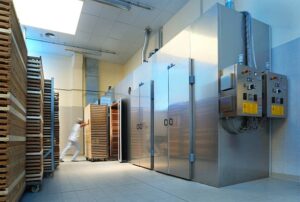In Melbourne’s bustling economic landscape, where industries ranging from food processing to pharmaceuticals thrive, the significance of efficient industrial refrigeration cannot be overstated. As businesses grapple with the need to preserve perishable goods, meet stringent regulatory standards, and reduce environmental impact, the demand for innovative refrigeration solutions has never been greater. In this article, we discover the latest advancements in industrial refrigeration in melbourne, highlighting how these innovations are reshaping the way goods are stored, transported, and distributed across the city.
Advanced Cooling Technologies:
 At the forefront of industrial refrigeration innovation in Melbourne are advancements in cooling technologies. While effective, traditional refrigeration systems often come with high energy consumption and maintenance costs. However, emerging technologies such as magnetic refrigeration and solid-state cooling offer promising alternatives. Magnetic refrigeration utilises the magnetocaloric effect to achieve cooling, eliminating the need for harmful refrigerants and reducing energy consumption significantly. Solid-state cooling, on the other hand, relies on thermoelectric materials to create temperature differentials, offering precise and efficient cooling solutions ideal for niche applications.
At the forefront of industrial refrigeration innovation in Melbourne are advancements in cooling technologies. While effective, traditional refrigeration systems often come with high energy consumption and maintenance costs. However, emerging technologies such as magnetic refrigeration and solid-state cooling offer promising alternatives. Magnetic refrigeration utilises the magnetocaloric effect to achieve cooling, eliminating the need for harmful refrigerants and reducing energy consumption significantly. Solid-state cooling, on the other hand, relies on thermoelectric materials to create temperature differentials, offering precise and efficient cooling solutions ideal for niche applications.
Integration of Renewable Energy:
In line with Melbourne’s commitment to sustainability, the integration of renewable energy sources into industrial refrigeration systems is gaining traction. Solar-powered refrigeration, for instance, harnesses abundant sunlight to generate electricity, powering refrigeration units while reducing reliance on the grid. Additionally, innovative technologies such as absorption chillers can utilise waste heat from industrial processes or biomass combustion to drive cooling cycles, further enhancing energy efficiency and reducing carbon emissions. By embracing renewable energy solutions, Melbourne’s businesses can not only decrease their environmental footprint but also mitigate the impact of rising energy costs.
Smart Refrigeration Management:
The advent of the Internet of Things (IoT) has revolutionised the way industrial refrigeration in melbourne is managed and monitored. Smart sensors embedded within refrigeration units collect real-time data on temperature, humidity, and energy consumption, allowing for proactive maintenance and optimisation. Advanced analytics and machine learning algorithms analyse this data to predict potential faults or inefficiencies, enabling preemptive corrective actions and minimising downtime. Moreover, cloud-based monitoring platforms provide remote access to refrigeration systems, allowing businesses to monitor and control their operations from anywhere, enhancing flexibility and efficiency.
Adoption of Natural Refrigerants:
In response to ecological concerns and regulatory pressures, Melbourne’s businesses are increasingly adopting natural refrigerants as alternatives to synthetic ones. Usual refrigerants such as ammonia, carbon dioxide, and hydrocarbons offer several advantages, including lower global warming potential and ozone depletion potential. Additionally, they are non-toxic, non-flammable, and widely available, making them suitable for a variety of applications. By transitioning to natural refrigerants, businesses not only ensure acquiescence with regulatory requirements but also contribute to the preservation of the environment and public health.
Cold Chain Optimization:
Efficient cold chain management is essential for ensuring the integrity and safety of perishable goods throughout the supply chain. In Melbourne, where food and pharmaceutical industries heavily rely on cold chain logistics, optimisation is paramount. Innovations such as blockchain technology offer transparent and traceable cold chain solutions, enabling stakeholders to trail the journey of goods from production to consumption accurately. Furthermore, autonomous refrigerated transport vehicles equipped with temperature-monitoring systems and route optimisation algorithms enhance efficiency and reliability while reducing operational costs and carbon emissions.
Customised Refrigeration Solutions:
Recognising the diverse needs of Melbourne’s businesses, refrigeration manufacturers are increasingly offering customised solutions tailored to specific industry requirements. Modular refrigeration systems, for instance, allow businesses to scale their cooling capacity as needed, minimising upfront costs and maximising flexibility. Additionally, hybrid refrigeration systems that combine multiple cooling technologies offer enhanced reliability and efficiency, particularly in challenging environments. By partnering with experienced refrigeration providers, Melbourne’s businesses can access bespoke solutions that address their unique operational challenges and optimise performance.
Innovations in industrial refrigeration in melbourne are reshaping the landscape of Melbourne’s business ecosystem, offering sustainable, efficient, and adaptable solutions to meet the evolving needs of various industries. From advanced cooling technologies and renewable energy integration to smart refrigeration management and cold chain optimisation, businesses in Melbourne have access to a diverse array of innovative solutions. By embracing these technologies and collaborating with experienced refrigeration partners, Melbourne’s businesses can enhance their competitiveness, decrease operational costs, and contribute to a more sustainable future for the city and beyond.